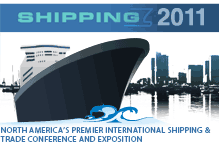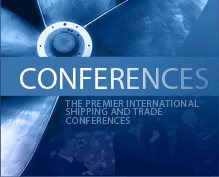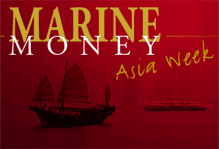
High Yield 2000: A View from the Rail
By Alan Ginsberg, Director of High Yield Research, Scotia Capital (USA) Inc.
When I was still a boy, my father told me that the only people who made money at the racetrack were the guys who sold the hay and shoveled the manure. Only since I joined Wall Street as a high yield-shipping analyst have I begun to appreciate how prescient my father’s remarks were.
This past racing season (read year) has largely been an extension of the prior season: too few winners and too many losers. It is a far cry from 1997 when owners (prospective issuers) were jostling with one another to get to the track (high yield market) first.
Continue Reading
Greek shipping analysed in terms of type of vessel.
This is the first of a two-part research analysis on the types of vessels managed by Greek Shipmanagement companies
By Ted Petropoulos, MD of Petrofin S.A., and Isabella Constantinidou, Research Analyst of Petrofin S.A.
Petrofin Research has, over the past four years, analysed the number, fleet size and age of vessels in Greek shipping fleets drawing some very interesting conclusions on the structure and trends of Greek shipping and linking this research to on-going debates on subjects such as economies of scale, consolidation trends and the inter-relationship between average fleet size of Greek shipmanagement and the average age of such fleets.
This year, Petrofin Research has extended its scope to also examine the trends of ownership in terms of specific vessel types.
Continue Reading
Year 2000: The Greek Experience
By Kevin Oates, in Piraeus
Being Greek and going public
We have said it before and we will say it again, being Greek and being a public company do not always go hand in hand. Greek shipowners are very private people. They do not like others prying into their private affairs – especially their bank accounts – and they do not want others interfering with the running of their business. On the whole, decision – making is centralised at the top and other managers within the company are delegated lesser or greater authority. Some Greek shipowners are fabulously wealthy individually but their shipping companies suffer like any other in a depressed market. Sometimes when the cash flow is insufficient to pay obligations in full, the bank is visited and a restructure is requested.
Continue Reading
Company of the Year – Frontline
The editors of Marine Money voted unanimously for the Best Shipping Company of 2000, the verdict; Frontline. This year alone, John Fredriksen and his tireless two-man army have taken over Golden Ocean and are in the process of acquiring Osprey Maritime. Frontline was also instrumental in organizing the Tankers International pool with fellow VLCC owners AP Moller, OSG, Euronav and Osprey. Other Frontline acquisitions in recent years include a long, and ultimately successful, dogfight with ICB, London and Overseas Freighters, and the equity interest in California Petroleum, Golden State and Windsor Petroleum. Continue Reading
Shipping Equities 2000: ALL ABOARD!
By Nicolai Heidenreich
The equity markets for maritime shares have performed not only above all expectations but also better than anyone can remember. Looking at the charts in this article it is very interesting to see that although all sectors, with the exception of the container sector have outperformed the Dow Jones, down more then 8% this year, they all started their turnaround at different points in time. Marine Money follows 80 shares weekly and they form the basis for the Marine Money Equity Indices on which we have based this Year in Review.
Continue Reading
Tidbits From “Freshly Minted” November 9th 2000
OMI INSIDER TRADE
OMI senior VP and Director Michael Klebanoff bought 20,000 shares of his company’s stock for $7.44 each on October 17th. The purchase cost Mr. Klebanoff $148,800 and is now worth $126,200, a net, though unrealized, loss of $22,600.
ELETSON HOLDINGS GOES PUBLIC, SORT OF
Just one week after the company’s 3Q conference call, Eletson Corporation announced that Eletson Holdings Inc., the company that issued US high yield bonds, has purchased two coated aframax newbuildings from affiliates of the company for an undisclosed sum of money. The strong tanker market improved Eletson’s EBITDA / debt service ratios which eased certain bond covenants that had prevented the transaction from occurring previously. By way of background, the ships were ordered at Hyundai about two weeks before Posidonia. Eletson still has three panamax vessels that reside outside the bond company.
Continue Reading
THE LAZARD SUMMIT: CARPE DIEM & CAVEAT EMPTOR
By Urs M. Dür
From Freshly Minted, November 9, 2000.
Lazard Frères hosted their “Tanker Summit” in Manhattan on the 7th of November. The event focused on the fundamentals supporting the shares of Stolt Nielsen (OTC: STLBY), Teekay Shipping (NYSE: TK), Knightsbridge Tankers (OTC: VLCCF), Nordic American Tankers (AMEX: NAT) and Frontline Ltd (OTC-ADR: FRONY). Notable absentees were OMI and OSG.
The summit stressed the promising bullish fundamentals of the crude tanker market. It also revealed some real investor skepticism as to whether the boom was fundamentally sustainable and whether any further investment in the field, in light of this year’s run-up in tanker shares was warranted at this time.
Continue Reading
AT THE END OF THE GREEK RAINBOW
As the days in London and New York were getting darker and colder, the 2nd Annual Ship Finance Forum in Athens gave us the perfect opportunity to travel to the warmer climate of the Mecca of shipping. The buzz around this year’s event was very similar to that of last year, everyone wanted to know if and when they could list their companies on the stock exchanges of Athens or Cyprus. The replies from the speakers this time however was very different. As can be seen on the two accompanying charts the market sentiment in both Greece and Cyprus has changed dramatically. The Athens Stock Exchange General Index is down 35% since last year’s event and 40% since its all time high in September of 1999, the Cyprus General Index is down 50% since we last were in Greece and 66% since its all time high in November of the same year. So the investor sentiment had obviously changed but was there a chance to get a deal done.
Continue Reading
DETERMINING THE COST OF EQUITY
Part 2 of 2
By Geoff Uttmark
Part 1 of this article (MM Vol. 16, Number 9) presented the primary sources of capital for shipping and their relative cost. In most cases, debt is the preferred finance vehicle due to the higher return on equity that is possible from using leverage, the inability of many shipping company balance sheets to finance all-cash acquisition of vessels and the fungiblity of assets that makes ship finance attractive to lenders. Ship owners can compare their fleets and balance sheets to similarly sized companies to garner the feasibility and approximate cost of a particular debt instrument in the current lending climate. A technique was presented using historic data for MIF, Ltd. to calculate the contribution (or cost) to earnings from debt financed assets. Debt is carried, of course, on the balance sheet, but the effect of debt is more pronounced on the income statement of companies in cyclical industries like shipping. This is the point, obviously, of leverage, provided managers get the timing right, but “point” may not be exactly the right word to use. Better maybe to call it a fulcrum, since in the present ship finance climate, bankers are looking for equity on the balance sheet. Compared to pricing debt, pricing equity is more quantitative than qualitative, and only by knowing how to run all the numbers can a ship owner be confident of his competitive standing on the CAPEX front. As noted in Part 1 of this article, CAPEX, in the form of debt service, is often an owner’s single greatest expense item. It is also a fixed expense. The pivotal role played by equity in ship finance hence is critical, as it is the component of CAPEX that carries no fixed charges and is leverageable.
Continue Reading
Alternative Financing Technologies: Is the KG Right for Your Shipping Company?
By Jürgen Salamon, Managing Partner, Dr. Peters Group, Dortmund, Germany
It is a great pleasure and an honour for me to introduce the Limited Partnership system and the latest developments within the German Limited Partnership system to you. Over the past years, it has not only been the major German Shipping Banks but also German Limited Partnership financiers who have achieved their share in the financing of international tonnage.
In order to understand the KG system one has to know and comprehend the German laws on taxation. The German tax system is deemed to be one of the most complicated and regulated systems in the world. For instance, we have to pay 53 % income tax, 9 % church tax, deducted at source by the State on behalf of the churches, we also pay 5.5 % solidarity contribution, which is a result of the reunification of Germany. On 3 June 2000, we had a special “Tax Payer Memorial Day”. This is a day, which is annually announced by the Association of Taxpayers. The day up to which, on average, all Germans will have solely worked in order to be able to pay their taxes to the Inland Revenue. This year this will be 153 days in total. However, it is to be noted that for those of who normally pay top revenue rates this number may easily amount to 220 working days work needed only to pay the tax they owe to the Inland Revenue.
Continue Reading







